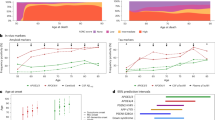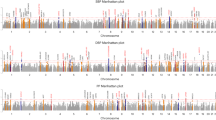Abstract
Coding variants within the APOL1 gene have been associated with kidney disease, explaining an association that was previously attributed to variants within the neighbouring MYH9 gene. To better define the role of APOL1 in causing kidney disease in individuals of African ancestry, we performed an extensive survey of the common variation in the region surrounding the APOL1 gene, as seen through the lens of the 1000 Genomes Project. Arguing by exclusion, it is reasonable to conclude that the putative APOL1 causal variants are not proxies for any other variants with more direct roles in kidney disease. Our statistical argument is in part made possible by the exceptionally young age of the APOL1 coding variants coupled with the unusually high rate of genetic recombination surrounding this gene. Although no biological evidence currently exists for the causality of APOL1 variants with kidney disease, our statistical reasoning provides a strong case for causality, and a region to target in future functional studies.
This is a preview of subscription content, access via your institution
Access options
Subscribe to this journal
Receive 12 print issues and online access
$209.00 per year
only $17.42 per issue
Buy this article
- Purchase on Springer Link
- Instant access to full article PDF
Prices may be subject to local taxes which are calculated during checkout


Similar content being viewed by others
References
Byrne, C., Nedelman, J., & Luke, R. G. Race, socioeconomic status, and the development of end-stage renal disease. Am. J. Kidney Dis. 23, 16 (1994).
U. S. Renal Data System, USRDS 2012 Annual Data Report: Atlas of Chronic Kidney Disease and End-Stage Renal Disease in the United States, National Institutes of Health, National Institute of Diabetes and Digestive and Kidney Diseases, Bethesda, MD (2012).
Kopp, J. B. et al. MYH9 is a major-effect risk gene for focal segmental glomerulosclerosis. Nat. Genet. 40, 1175–1184 (2008).
Kao, W. H. et al. MYH9 is associated with nondiabetic end-stage renal disease in African Americans. Nat. Genet. 40, 1185–1192 (2008).
Arrondel, C. et al. Expression of the nonmuscle myosin heavy chain IIA in the human kidney and screening for MYH9 mutations in Epstein and Fechtner syndromes. J. Am. Soc. Nephrol. 13, 65–74 (2002).
Freedman, B. I. et al. Polymorphisms in the non-muscle myosin heavy chain 9 gene (MYH9) are strongly associated with end-stage renal disease historically attributed to hypertension in African Americans. Kidney Int. 75, 736–745 (2009).
Freedman, B. I. et al. Non-muscle myosin heavy chain 9 gene MYH9 associations in African Americans with clinically diagnosed type 2 diabetes mellitus-associated ESRD. Nephrol. Dial. Transplant. 24, 3366–3371 (2009).
Freedman, B. I. et al. Polymorphisms in the nonmuscle myosin heavy chain 9 gene (MYH9) are associated with albuminuria in hypertensive African Americans: the HyperGEN Study. Am. J. Nephrol. 29, 626–632 (2009).
Behar, D. M. et al. African ancestry allelic variation at the MYH9 gene contributes to increased susceptibility to non-diabetic end-stage kidney disease in Hispanic Americans. Hum. Mol. Genet. 19, 1816–1827 (2010).
Nelson, G. W. et al. Dense mapping of MYH9 localizes the strongest kidney disease associations to the region of introns 13 to 15. Hum. Mol. Genet. 19, 1805–1815 (2010).
Franceschini, N. et al. The association of the MYH9 gene and kidney outcomes in American Indians: the Strong Heart Family Study. Hum. Genet. 127, 295–301 (2010).
The International HapMap Consortium. A second generation human haplotype map of over 3.1 million SNPs. Nature 449, 851–861 (2007).
Hinds, D. A. et al. Whole-genome patterns of common DNA variation in three human populations. Science 307, 1072–1079 (2005).
Collins, F. S., Brooks, L. D. & Chakravarti, A. A DNA polymorphism discovery resource for research on human genetic variation. Genome Res. 8, 1229–1231 (1998).
Clark, A. G., Hubisz, M. J., Bustamante, C. D., Williamson, S. H. & Nielsen, R. Ascertainment bias in studies of human genome-wide polymorphism. Genome Res. 15, 1496–1502 (2005).
The 1000 Genomes Project Consortium. A map of human genome variation from population-scale sequencing. Nature 467, 1061–1073 (2010).
Genovese, G. et al. Association of trypanolytic ApoL1 variants with kidney disease in African Americans. Science 329, 841–845 (2010).
Tzur, S. et al. Missense mutations in the APOL1 gene are highly associated with end stage kidney disease risk previously attributed to the MYH9 gene. Hum. Genet. 128, 345–350 (2010).
Reeves-Daniel, A. M. et al. The APOL1 gene and allograft survival after kidney transplantation. Am. J. Transplant. 11, 1025–1030 (2011).
Papeta, N. et al. APOL1 variants increase risk for FSGS and HIVAN but not IgA nephropathy. J. Am. Soc. Nephrol. 22, 1991–1996 (2011).
Kanji, Z. et al. Genetic variation in APOL1 associates with younger age at hemodialysis initiation. J. Am. Soc. Nephrol. 22, 2091–2097 (2011).
Friedman, D. J., Kozlitina, J., Genovese, G., Jog, P. & Pollak, M. R. Population-based risk assessment of APOL1 on renal disease. J. Am. Soc. Nephrol. 22, 2098–2105 (2011).
Madhavan, S. M. et al. APOL1 localization in normal kidney and nondiabetic kidney disease. J. Am. Soc. Nephrol. 22, 2119–2128 (2011).
Kopp, J. B. et al. APOL1 genetic variants in focal segmental glomerulosclerosis and HIV-associated nephropathy. J. Am. Soc. Nephrol. 22, 2129–2137 (2011).
Myers, S., Freeman, C., Auton, A., Donnelly, P. & McVean, G. A common sequence motif associated with recombination hot spots and genome instability in humans. Nat. Genet. 40, 1124–1129 (2008).
Reich, D. et al. Reduced neutrophil count in people of African descent is due to a regulatory variant in the Duffy antigen receptor for chemokines gene. PLoS Genet. 5, e1000360 (2009).
Johnson, A. D. et al. SNAP: a web-based tool for identification and annotation of proxy SNPs using HapMap. Bioinformatics 24, 2938–2939 (2008).
Thorvaldsdóttir, H., Robinson, J. T., Mesirov, J. P. Integrative Genomics Viewer (IGV): high-performance genomics data visualization and exploration. Brief Bioinform. http://dx.doi.org/10.1093/bib/bbs017.
Handsaker, R. E., Korn, J. M., Nemesh, J. & McCarroll, S. A. Discovery and genotyping of genome structural polymorphism by sequencing on a population scale. Nat. Genet. 43, 269–276 (2011).
Smith, M. W. et al. A high-density admixture map for disease gene discovery in African Americans. Am. J. Hum. Genet. 74, 1001–1013 (2004).
Genovese, G. et al. A risk allele for focal segmental glomerulosclerosis in African Americans is located within a region containing APOL1 and MYH9. Kidney Int. 78, 698–704 (2010).
Fine, D. M. et al. APOL1 risk variants predict histopathology and progression to ESRD in HIV-related kidney disease. J. Am. Soc. Nephrol. 23, 343–350 (2012).
Ashley-Koch, A. E. et al. MYH9 and APOL1 are both associated with sickle cell disease nephropathy. Br. J. Haematol. 155, 386–394 (2011).
Behar, D. M. et al. Absence of APOL1 risk variants protects against HIV-associated nephropathy in the Ethiopian population. Am. J. Nephrol. 34, 452–459 (2011).
Bockenhauer, D., Medlar, A. J., Ashton, E., Kleta, R. & Lench, N. Genetic testing in renal disease. Pediatr. Nephrol. 27, 873–883 (2012).
Rosset, S., Tzur, S., Behar, D. M., Wasser, W. G. & Skorecki, K. The population genetics of chronic kidney disease: insights from the MYH9–APOL1 locus. Nat. Rev. Nephrol. 7, 313–326 (2011).
Freedman, B. I. & Langefeld, C. D. The new era of APOL1-associated glomerulosclerosis. Nephrol. Dial. Transplant. 27, 1288–1291 (2012).
NHLBI Exome Sequencing Project. Exome Variant Server [online], (2011).
Bostrom, M. A. et al. Genetic association and gene-gene interaction analyses in African American dialysis patients with nondiabetic nephropathy. Am. J. Kidney Dis. 59, 210–221 (2012).
Tzur, S., Rosset, S., Skorecki, K. & Wasser, W. G. APOL1 allelic variants are associated with lower age of dialysis initiation and thereby increased dialysis vintage in African and Hispanic Americans with non-diabetic end-stage kidney disease. Nephrol. Dial. Transplant. 27, 1498–1505 (2012).
Cheng, W. et al. Polymorphisms in the nonmuscle myosin heavy chain 9 gene (MYH9) are associated with the progression of IgA nephropathy in Chinese. Nephrol. Dial. Transplant. 26, 2544–2549 (2011).
O'Seaghdha, C. M. et al. The MYH9/APOL1 region and chronic kidney disease in European-Americans. Hum. Mol. Genet. 20, 2450–2456 (2011).
Cooke, J. N. et al. Polymorphisms in MYH9 are associated with diabetic nephropathy in European Americans. Nephrol. Dial. Transplant. 27, 1505–1511 (2011).
Freedman, B. I. et al. Differential effects of MYH9 and APOL1 risk variants on FRMD3 association with diabetic ESRD in African Americans. PLoS Genet. 7, e1002150 (2011).
Author information
Authors and Affiliations
Contributions
All authors contributed equally to all aspects of this manuscript.
Corresponding author
Ethics declarations
Competing interests
G. Genovese, D. J. Friedman and M. R. Pollak have filed a patent in relation to this topic.
Rights and permissions
About this article
Cite this article
Genovese, G., Friedman, D. & Pollak, M. APOL1 variants and kidney disease in people of recent African ancestry. Nat Rev Nephrol 9, 240–244 (2013). https://doi.org/10.1038/nrneph.2013.34
Published:
Issue Date:
DOI: https://doi.org/10.1038/nrneph.2013.34
This article is cited by
-
GWAS in people of Middle Eastern descent reveals a locus protective of kidney function—a cross-sectional study
BMC Medicine (2022)
-
SNPs at 3′UTR of APOL1 and miR-6741-3p target sites associated with kidney diseases more susceptible to SARS-COV-2 infection: in silco and in vitro studies
Mammalian Genome (2021)
-
The podocin V260E mutation predicts steroid resistant nephrotic syndrome in black South African children with focal segmental glomerulosclerosis
Communications Biology (2019)
-
An African perspective on the genetic risk of chronic kidney disease: a systematic review
BMC Medical Genetics (2018)
-
Hypertension-attributed nephropathy: what's in a name?
Nature Reviews Nephrology (2016)



